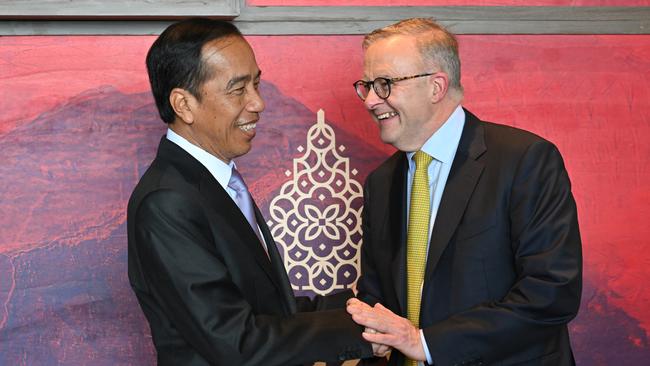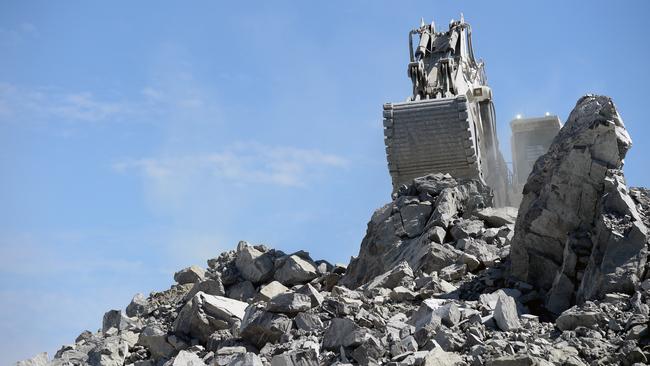Australia on the cusp of signing a lithium joint venture with Indonesia
The first Australia-Indonesia lithium mining and processing joint venture could be signed next month to coincide with President Joko Widodo’s visit to Australia.

The first Australia-Indonesia lithium mining and processing joint venture could be signed next month to coincide with President Joko Widodo’s visit to Australia, in what Jakarta hopes will be the first concrete steps towards building a joint EV production hub weatherproofed against global supply chain disruptions.
Arsjad Rasjid, head of the Indonesian Chamber of Commerce (KADIN) and president of Indonesian coal and energy player Indika Energy, told the Weekend Australian talks between an Australian lithium producer and an Indonesian investor to create a mine-to-electric vehicle manufacturing partnership were at a key stage.
“Discussions are under way towards a joint venture on lithium. I’m hoping negotiations can happen very quickly. If we can agree to basic terms that then we can go ahead with due diligence,” Mr Rasjid said ahead of his own two-day visit to Sydney next Monday as current chair of the ASEAN Business Advisory Council.
“I told the Australian guys the president of Indonesia is coming to Australia and if you want to get the attention and support from government we need to have something to show them.

“I’m crossing my fingers for the first joint venture to be announced during Jokowi’s visit.”
The potential landmark deal follows the signing of a memorandum in February between KADIN and the WA government to explore partnership opportunities in critical minerals for the booming battery and EV industry.
During that visit Mr Rasjid met with representatives from Global Lithium, Lightning Minerals and Mineral Alliance Asset.
Indonesia aims to reach zero emissions by 2060 and reduce its carbon footprint by 2030, in part by ramping up production of EV batteries and electric cars that it can also sell to Western markets. President Widodo appealed directly to Anthony Albanese last November at the B20 summit – a high-level business meeting involving delegates from the world’s 20 largest economies that was held alongside the Indonesia-hosted G20 leaders’ talks in Bali – to co-operate in the production of EV batteries.
Jokowi, as the Indonesian leader is known, is expected to again raise the issue with Mr Albanese when they meet in Sydney during his July 4 and 5 visit, probably his last to Australia before next February’s presidential elections.
Australia is home to at least half the world’s lithium resources, while Indonesia has the world’s largest reserves of nickel, two critical minerals in the production of EV batteries.

But China still dominates the world’s lithium supply chain, raising concerns about security of supply in an era of intense competition and a rapid decoupling of the US-China technology trade.
Mr Rasjid has been a key driver in the push to build a “powerhouse” Australia-Indonesia EV hub. As host nation Indonesia’s B20 chairman last year, he pushed for Mr Albanese to deliver the keynote speech at the November summit in recognition of the “unprecedented goodwill” between the two governments.
The Albanese government had proven its willingness to build the bilateral economic relationship, not just by making Jakarta the PM’s first official overseas visit, but by encouraging investment by Australian pension funds, which were in ongoing discussions with the Indonesian Investment Authority (INA), he said.
“Australian pension funds never looked at Indonesia before, but since last year they’ve been coming here and discussing with the INA so there is already trust building with regards to investment. We want to build a regional EV ecosystem with Australia, have Australian companies invest in that ecosystem.

“There are 700 million people in the ASEAN market and Australia can get a part of the pie.”
But he also warned the new “cold war economy” – in which the US and EU were working to reduce their reliance on Chinese critical technologies – was creating obstacles to building green industries, by requiring two streams of investment: one with Chinese companies and another without.
Under the US Inflation Reduction Act, which promotes “made in America” electric vehicles but provides subsidies for free trade partners like Australia, any involvement by entities of concern – including China and Russia – in the sourcing of critical materials, battery components or manufacturing disqualifies the battery from the subsidies.
“To be very frank one of our biggest obstacles is that most of the critical minerals in Australia have been bought up by the Chinese,” Mr Rasjid said.
“What we are trying to do is secure non-Chinese joint ventures because we need both,” in order to insulate against further escalation in US China tensions.
“Unfortunately this is the world today so we just have to be agile and adjust. With the US new Inflation Reduction Act and what’s happening with Europe there are going to be two global supply chains. That is an economic cold war.
“That’s why we are saying to Australia: ‘Let’s go and invest together’. If we combine our knowledge, our resources, technology and funding I think we can do it.”




To join the conversation, please log in. Don't have an account? Register
Join the conversation, you are commenting as Logout